Herbal Teas - Teabags
-
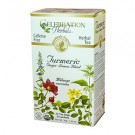
Tumeric, Ginger-Lemon Blend
Designation: Absolutely Organic
Item Order #: T5184Native to Southeast Asia, Turmeric is a popular spice which is cultivated throughout the tropics worldwide. It has a deep orange colour and peppery warm flavour. Turmeric was introduced into Europe by traders in the 13th century but has only recently gained popularity in Western cultures for both its flavour and medicinal benefits.
Learn More
This mildly spicy blend is so well balanced, that that you can’t even taste the Turmeric, making this a great pleasure and medicinal tea. We’re sure you’ll make this part of your daily routine. -
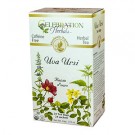
Uva Ursi
Designation: Absolutely Organic
Item Order #: T187Since the 13th century, Uva Ursi has been commonly used throughout Europe, but was not officially recognized as a valuable herb until 1788. Later, it was introduced to North America by the early settlers, where Native Americans would know Uva Ursi as "kinnikinnick." They considered it to be a nutritious food and ate the berries raw, juiced, or ground.
Learn More
Today, it is common practice to use Uva Ursi leaves in tinctures or teas because they are considered the most medicinally potent part of the plant.
Try this distinctive tea today. -
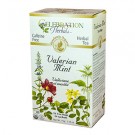
Valerian Mint
Designation: Absolutely Organic
Item Order #: T189Valerian is a very powerful and distinct tasting root that has been used since the 10th century. It is often used to unwind after a busy day or enjoyed before bed. Peppermint is known for its clean, refreshing flavour and sensation of coolness. It is widely used as a flavouring agent and fragrant oil.
Learn More
Blended together, Valerian and Peppermint balance each other to create a relaxing, traditional tea. -
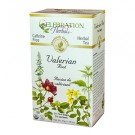
Valerian Root
Designation: Absolutely Organic
Item Order #: T188Valerian derives its name, in part, from the Latin word valere, meaning ‘to be in good heath’ or ‘to make strong.’ It has been in use by the Arabs since the 10th century. Native to Europe and parts of Asia, Valerian has since been naturalized to North America where it grows in low lying, nutrient rich meadows. This distinctive tasting tea is made from Valerian’s many long, slender roots.
Learn More
Valerian tea is often used to unwind after a busy day, or enjoyed before bed. -

White Oak Bark
Designation: Absolutely Organic
Item Order #: T192White Oak is a stately and long-lived tree native to Europe which has been completely naturalized to North America. Writings of the esteemed Oak tree have been traced back to the earliest Indo-Germanic religions, giving it great symbolic and religious significance. In the days of the early settlers, Native Americans were using this herb; the uses they recorded for this esteemed herb are still prominent today.
Learn More -
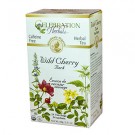
Wild Cherry Bark
Designation: Absolutely Organic
Item Order #: T193The Wild Cherry tree is native to the south-western United States. The dark outer bark is rough and separates easily from the trunk. Just under the outer bark, is the tender inner bark, which smells of bitter almonds when collected and is used for tea.
Learn More
Wild Cherry has a long history of use and was a herb of importance to the Native Americans. Today, it can be found in many herbal preparations. -
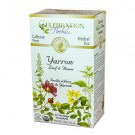
Yarrow Leaf & Flower
Designation: Absolutely Organic
Item Order #: T194Yarrow has a history dating back as far as the battle of Troy, where it was used to treat injured soldiers and adopted the common name of 'soldier's woundwort'. The ancient Greeks gave Yarrow the name ‘Achillea’ after Achilles, the legendary heroic warrior.
Learn More
This perennial herb grows to about 3 feet tall and is found in Europe, west Asia, and North America. The white flowers appear in flat, daisy-like clusters. It may be found in pastures, meadows, and along roadsides.
Yarrow makes a very good medicinal tea with a strong, astringent taste. -
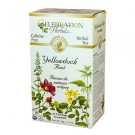
Yellowdock Root
Designation: Absolutely Organic
Item Order #: T5194Native to Europe, Yellowdock is a perennial that grows in fields and meadows that are common throughout the United States and Southern Canada.
Learn More
The long golden-hued tap root is cursed by farmers and proud home owners as a troublesome intruder, but praised by old time doctors, early settlers, and herbal practitioners. The greatest medicinal value comes from the yellowish spindle-shaped root.
The tea scarcely has any odour, but an astringent taste that feels very satisfying especially after a hearty meal. -
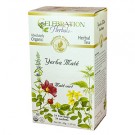
Yerba Maté
Designation: Absolutely Organic
Item Order #: T5195Yerba Maté, (pronounced herba-may-tay), comes from the Indian name maté meaning "drinking vessel" or "gourd". Jesuits added the word "yerba," meaning the herb of excellence. This tea grows mainly in Paraguay, Brazil, and Argentina, near streams and rivers. Yerba Maté is grown for its leaves; they are harvested and dried from December to August.
Learn More
In some South American countries this is a national drink, more popular than coffee or any other type of tea. Add a little lemon or Stevia for a traditional flavour, sit back and enjoy. -
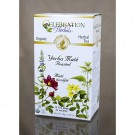
Yerba Maté Roasted
Designation: Absolutely Organic
Item Order #: T5197Yerba Maté, (pronounced herba-may-tay), also known as "Jesuit's tea," comes from the South American Indian name “maté” meaning "drinking vessel" or "gourd". Jesuits added the word "yerba," meaning the herb of excellence.
Learn More
This tea grows mainly in Paraguay, Brazil and Argentina, near streams and rivers and puts forth large white flowers. Maté is grown for its leaves; they are harvested and dried from December to August.
When roasted, Yerba Maté becomes complex and full of body, a perfect substitute for your morning coffee. Little wonder this is the preferred beverage of many South Americans. -
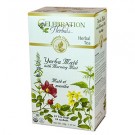
Yerba Maté with Morning Mint
Designation: Absolutely Organic
Item Order #: T5196Yerba Maté grows in Paraguay, Argentina, and Brasil near streams and rivers. It puts forth large white flowers, and has large, oval leaves that are harvested and dried between December and August.
Learn More
We have combined organic mints with South America's favourite tea to give you a morning pick-me-up. A great coffee substitute with a get-you-going fresh brewed taste.


